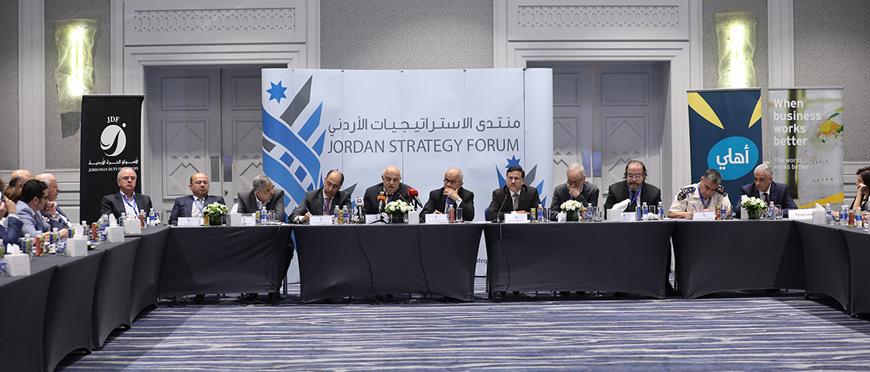You are here
Gov’t ‘committed’ to IMF-supervised reform plan
By Mohammad Ghazal - Jul 03,2018 - Last updated at Jul 03,2018
AMMAN — Jordan said on Monday that it is fully committed to the $700 million Extended Fund Facility (EFF) with the International Monetary Fund (IMF).
Jordanian officials will soon meet with IMF representatives to brief them on the situation in Jordan and present a national economic and fiscal reform plan that will be in line with the IMF programme and help realise its objectives, Deputy Prime Minister and Minister of State Rajai Muasher said on Monday.
“The national programme that we will discuss with the IMF will take our needs, priorities and conditions into account,” said Muasher in a meeting with media representatives.
In 2016, Jordan and the IMF reached the 36-month EFF programme under which the two sides agreed on six conditions that aim at reducing public debt to safe levels and stimulating the economy. Under the deal, Jordan is expected to generate around JD520 million dinars in additional revenues this year alone.
“We cannot go back on fiscal reforms. We are committed to the fiscal reforms,” said Muasher, adding that economic growth is weak, public debt is up and we have a budget deficit.”
Officials said Monday that the Kingdom, and in light of the difficult regional conditions and economic situation, is trying to come up with solutions to address the situation.
“To address the current challenges, the key is to achieve fiscal and monetary stability,” Minister of Finance Ezzeddine Kanakrieh said.
“Economic growth is less than the forecast,” said Kanakrieh.
Overall revenues generated during the first six months of 2018 are JD400 million less than that they were forecast in the state budget, the minister said, while economic growth in the first quarter of 2018 reached only 1.9 per cent.
Jordan needs around JD5 billion annually in financing to cover debt and Eurobonds. “We have a strategy to reduce the overall public debt, but there are still challenges,” said Kanakrieh.
Kanakreih said grants this year increased “thanks to His Majesty King Abdullah’s efforts”.
Grants for this year were estimated at JD700 million, but following pledges of new grants the number is expected to reach JD950 million.
“But the increase in grants does not cover the shortage in revenues,” said the minister.
During the meeting, Muasher announced that the government will study the overall tax burden in Jordan and will look into the impact of the sales and income tax on citizens and the various sectors.
The previous government’s decision to remove tax exemptions on hybrid cars and increase taxes on the industrial sector did not achieve desired results, the official noted.
“Increasing taxes does not necessarily mean increasing revenues,” said Muasher, adding that the impact of any new taxes needs to be thoroughly studied.
Muasher said the tax burden needs to be fairly distributed, adding that by focusing on increasing the sales tax over the past years it is the poor segments of society that are affected.
“We need to study the tax burden and make sure it is fair, and at the same time we need to improve services in various areas,” he added.
Around JD5.2 million are generated in taxes every year, of which around JD960 million is income tax, while the rest is sales tax.
“This is a very rare situation where the revenues from sales tax are four times higher than revenues from income tax. This is something that need to be studied,” said Muasher.
He said that any tax-related decision should help trigger economic growth, adding that the government has embarked on a national dialogue to reach a consensus about the income tax bill.
“This is a dialogue not for the sake of dialogue, but for reaching consensus and understanding about how to move forward,” said Muasher.
Related Articles
AMMAN — The government is gearing up towards controlling exemptions, which amounted to approximately JD1 billion in 2018, as per efforts to
AMMAN — Former finance ministers say the government needs to change its fiscal policy in order to achieve debt relief in the medium-term as
AMMAN — The International Monetary Fund’s (IMF) executive committee has endorsed the second review of Jordan’s economic reform programme, wh
















